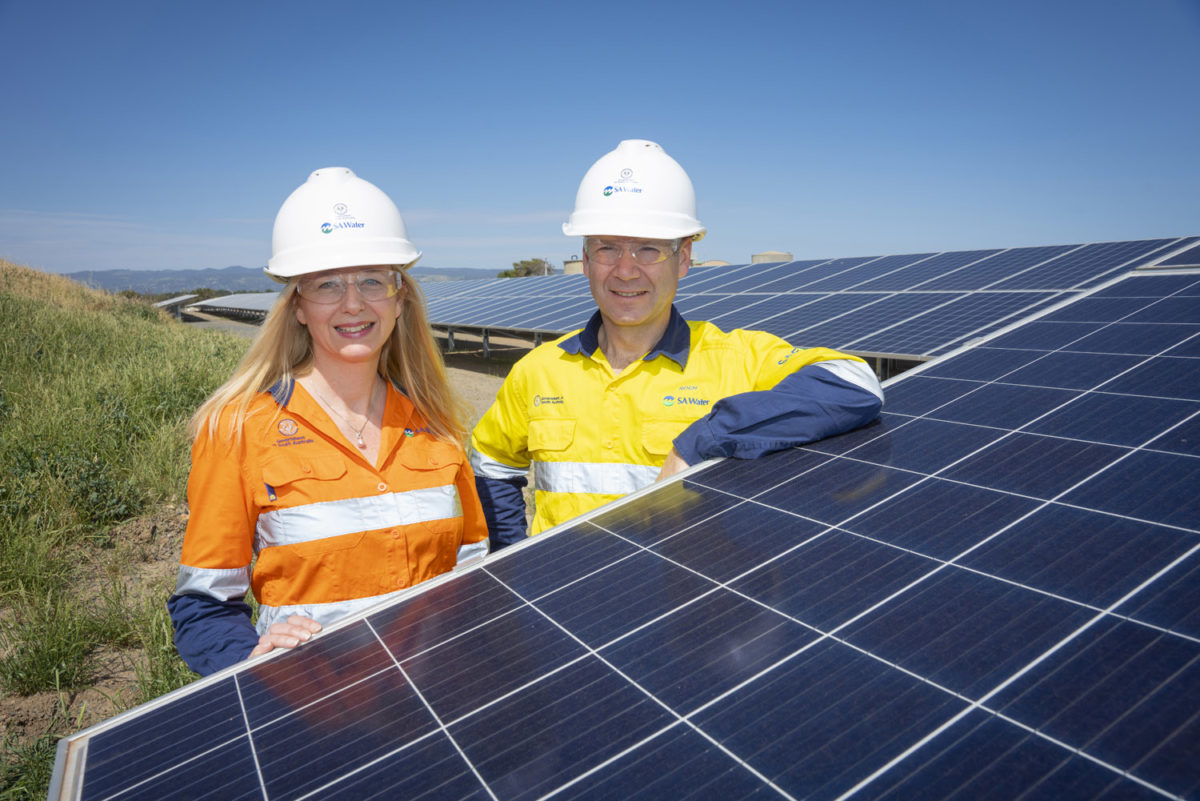After South Australia’s largest water and sewerage service supplier announced in January that it was planning to invest more than $300 million in solar and energy storage in 2020, perhaps SA Water could’ve checked its ambitions when the Covid-19 pandemic reared its elongated neck. However, SA Water is proving that it can meet with triumph and disaster and treat those two imposters just the same.
Indeed, despite the heavy impact of Covid-19 related restrictions across the economy, SA Water and ElectraNet have worked together and managed to keep the water supplier’s renewable energy project on track.
SA Water’s ambition is to achieve a zero cost energy future. To do this, the utility has embarked on a journey to neutralise its electricity bills through the installation of more than 500,000 solar panels across 35 metropolitan and regional sites. Of these 500,000 panels, 147,000 have already been installed at sites such as the Bolivar Wastewater Treatment Plant, Adelaide Desalination Plant and Christies beach Wastewater Treatment Plant.
SA Water’s Senior Manager Zero Cost Energy Future Nicola Murphy said both businesses readily adapted to the ever-changing situation to help reduce potential risks to the project’s construction target.
“During these challenging times, it’s important that we carry-on where possible with projects to improve our operations,” said Murphy, “while also supporting the state’s economy by keeping our partners and the supply chain working.”
Take the installation of 19,000 panels at the third pump station of the 358km Morgan to Whyalla Pipeline. By working closely, albeit not too closely, with ElectraNet, keeping strict social distancing, reducing personnel numbers, utilising virtual meetings, and using locally-based Enerven, the project was able to go ahead.
Finding ways to maintain progress throughout the height of Covid-19 restrictions means that SA Water’s green energy project remains in good stead and will prove an important energiser to the struggling economy.
“The project is quite complex with connection activities across multiple sites,” said ElectraNet’s Group Executive Corporate Development Ashley Manna. “Each site has presented its own unique challenges, which has meant effective and proactive communication between ElectraNet, SA Water and its contractors has been essential.”
Fortune Favours the Bold
Despite the unprecedented pressure from the pandemic on SA Water’s green development projects, the utility is already proposing seven more solar farms. The Essential Services Commission of South Australia (ESCOSA) has received two applications from SA Water to vary its electricity generation licence to authorise the operation of:
- a 3.675MW solar generating plant at Glenelg
- a 19.24MW solar generating plant at Bolivar
- a 15.5MW solar generating plant at the Adelaide Desalination Plant
- a 5.5MW solar generating plant at Morgan Whyalla 1
- a 5.5MW solar generating plant at Morgan Whyalla 2
- a 7.5MW solar generating plant at Morgan Whyalla 3, and
- a 5.5MW solar generating plant at Morgan Whyalla 4.
Not only is SA Water undaunted by economic pressure, but clearly its solar developments have empowered the utility in the way only renewable energy can.
In addition to the ongoing success of its green energy development project, SA Water has earned itself another win recently with the awarding of its new Murray Bridge Wastewater Treatment plant with the Infrastructure Sustainability Council of Australia’s (ISCA) highest design rating to date for a water or wastewater project in Australia.
The $52 million Murray Bridge Wastewater Treatment plant south-east of Adelaide became fully operational at the end of June, 2020, utilising the site’s 420 ground-mounted solar panels’ 150kw of daily renewable generation.
This content is protected by copyright and may not be reused. If you want to cooperate with us and would like to reuse some of our content, please contact: editors@pv-magazine.com.









2 comments
By submitting this form you agree to pv magazine using your data for the purposes of publishing your comment.
Your personal data will only be disclosed or otherwise transmitted to third parties for the purposes of spam filtering or if this is necessary for technical maintenance of the website. Any other transfer to third parties will not take place unless this is justified on the basis of applicable data protection regulations or if pv magazine is legally obliged to do so.
You may revoke this consent at any time with effect for the future, in which case your personal data will be deleted immediately. Otherwise, your data will be deleted if pv magazine has processed your request or the purpose of data storage is fulfilled.
Further information on data privacy can be found in our Data Protection Policy.